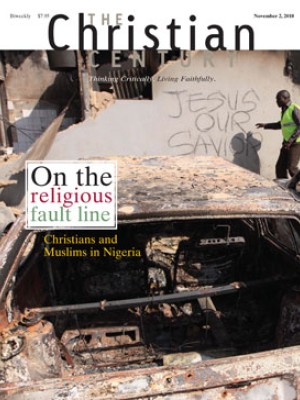No exemptions for faith
Earlier this year, a group of English bishops charged that the nation's Christians faced systematic discrimination that endangered their right to hold public office. Some even warned that anti-Christian hostility amounted to open persecution, which could provoke civil unrest. Pope Benedict, meanwhile, charged that new British statutes clearly violated natural law.
Many commentators contended that the charges were excessive. This is, after all, England, where the church is established by law. Archbishop of Canterbury Rowan Williams especially criticized the use of the p-word at a time when Christians in Iraq, Sudan and elsewhere are being subjected to massacre and torture. But the fact that responsible leaders are using such inflammatory language demands explanation. If English—and European—Christians are not suffering persecution, they certainly are facing unprecedented legal challenges that will demand a thorough rethinking of their behavior and, perhaps, their doctrine.
Read our latest issue or browse back issues.
Any veteran of the U.S. culture wars will be familiar with the issues involved, especially the debates over public displays of faith. One case that provoked the English churches involved a woman who was dismissed from her job as a nurse for refusing to remove the crucifix she wore. Her employers were happy to tolerate the headscarves of Muslim co-workers, which surely amounted to a comparable statement of religious loyalty.
Flashpoints of conflict often involve issues of gay rights, gay marriage and adoption. Over the past 20 years, English law has become massively more liberal in such matters. A sweeping new Equality Act prohibits all forms of discrimination based on race, gender, sexual orientation and disability.
So far, little of this story would surprise Americans. But there is one critical transatlantic difference. When American jurisdictions pass laws demanding equal treatment they normally include a conscience clause allowing for exemptions on religious grounds. So, initially, did the British Equality Act, although in strikingly limited terms. A church may impose its own demands "if it is necessary to comply with its teachings or the strongly held beliefs of followers," but that exclusion covers only ministers of religion, narrowly defined. In order to be counted as clergy or ministers, individuals have to spend at least half their time engaged in leading worship and religious instruction. A church cannot refuse to hire gay or transgendered people for any nonclergy positions.
And now a far-reaching court decision may undermine even that grudging protection. The case involves Gary McFarlane, a relationship counselor whose duties included providing sex therapy. Approached by a gay couple for such therapy, he refused to cooperate, citing his evangelical Christian beliefs that homosexual conduct is sinful. When McFarlane was dismissed from his job, he took his case to the courts, where he received the powerful backing of some prominent religious leaders, including former archbishop of Canterbury George Carey.
But to no avail. Not only did the court reject McFarlane's appeal, but the senior judge, Lord Justice Laws, condemned any exemptions whatever for religion or conscience. The superbly named Laws saw no need to conciliate such beliefs, because "religious faith is necessarily subjective, being incommunicable by any kind of proof or evidence." (So much for 2,000 years of theological reasoning and apologetics.) Therefore any laws providing religious exemptions would be "irrational" and, in their consequences, "divisive, capricious and arbitrary." Granting such an exemption on grounds of conscience would place Britain "on the road to a theocracy, which is of necessity autocratic." (Actually, theocracies are usually oligarchic—but that historical detail seems the least serious objection to the decision.)
If that was one freak decision, its impact would be strictly limited, but it joins a series of well-publicized British cases denying any notion of religious exemption: the street preacher arrested for denouncing homosexuality; the registrar (roughly equivalent to a justice of the peace) dismissed for refusing to carry out civil-partnership ceremonies; the exclusion of evangelical-minded pediatricians from panels deciding adoption placements. Conservative believers potentially find themselves barred from a growing number of positions involving issues of marriage and family. If future courts take Lord Justice Laws's decision seriously, even the very narrow conscience clause in current legislation would be invalid. Rowan Williams was right to question the language of "persecution" in such cases, but the critics make a serious point when they charge discrimination.
Will British churches have to defend their right to exclude women and gays—or non-Christians—from leadership positions? Will they be able to assert publicly their doctrines on sexual morality? Britain particularly, and Europe more generally, is moving to define religious freedom in ways that seem very strange to American eyes.






